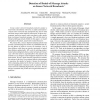Free Online Productivity Tools
i2Speak
i2Symbol
i2OCR
iTex2Img
iWeb2Print
iWeb2Shot
i2Type
iPdf2Split
iPdf2Merge
i2Bopomofo
i2Arabic
i2Style
i2Image
i2PDF
iLatex2Rtf
Sci2ools
101
click to vote
SP
2005
IEEE
2005
IEEE
Detection of Denial-of-Message Attacks on Sensor Network Broadcasts
So far, sensor network broadcast protocols assume a trustworthy environment. However, in safety and missioncritical sensor networks this assumption may not be valid and some sensor nodes might be adversarial. In these environments, malicious sensor nodes can deprive other nodes from receiving a broadcast message. We call this attack a Denial-of-Message Attack (DoM). In this paper, we model and analyze this attack, and present countermeasures. We present SIS, a Secure Implicit Sampling scheme that permits a broadcasting base station to probabilistically detect the failure of nodes to receive its broadcast, even if these failures result from an attacker motivated to induce these failures undetectably. SIS works by eliciting authenticated acknowledgments from a subset of nodes per broadcast, where the subset is unpredictable to the attacker and tunable so as to mitigate acknowledgment implosion on the base station. We use a game-theoretic approach to evaluate this scheme in the face of a...
Related Content
| Added | 25 Jun 2010 |
| Updated | 25 Jun 2010 |
| Type | Conference |
| Year | 2005 |
| Where | SP |
| Authors | Jonathan M. McCune, Elaine Shi, Adrian Perrig, Michael K. Reiter |
Comments (0)

